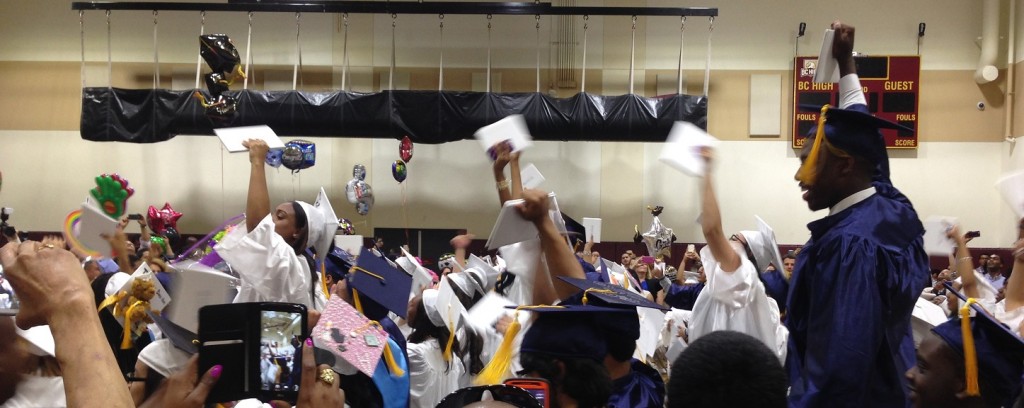It was a simple question, but we couldn’t find the answer in any of the paperwork the college had sent. How long was my family supposed to stay for orientation? This was 1999, so Google wasn’t really a verb yet, and we were a low-income family (according to my new school) without regular Internet access.
I was a first-generation college student as well as the first in our family to be born in America — my parents were born in Cuba — and we didn’t yet know that families were supposed to leave pretty much right after they unloaded your stuff from the car.
We all made the trip from Miami, my hometown, to what would be my new home at Cornell University. Shortly after arriving on campus, the five of us — my parents, my younger sister, my abuela and me — found ourselves listening to a dean end his welcome speech with the words: “Now, parents, please: Go!”
Almost everyone in the audience laughed, but not me, and not my parents. They turned to me and said, “What does he mean, Go?” I was just as confused as they were: We thought we all needed to be there for freshman orientation — the whole family, for the entirety of it. My dad had booked their hotel through the day after my classes officially began. They’d used all their vacation days from work and had been saving for months to get me to school and go through our orientation.
Every afternoon during that week, we had to go back to the only department store we could find, the now-defunct Ames, for some stupid thing we hadn’t known was a necessity, something not in our budget: shower shoes, extra-long twin sheets, mesh laundry bags. Before the other families left, we carefully watched them — they knew what they were doing — and we made new shopping lists with our limited vocabulary: Those things that lift up the bed, we wrote. That plastic thing to carry stuff to the bathroom.
My family followed me around as I visited department offices during course registration. Only four classes? they asked, assuming I was mistakenly taking my first semester too easy. They walked with me to buildings I was supposed to be finding on my own. They waited outside those buildings so that we could all leave from there and go to lunch together.
The five of us wandered each day through the dining hall’s doors. “You guys are still here!” the over-friendly person swiping ID cards said after day three. “They sure are!” I chirped back, learning via the cues of my hallmates that I was supposed to want my family gone. But it was an act: We sat together at meals — amid all the other students, already making friends — my mom placing a napkin and fork at each place, setting the table as we did at home.
I don’t even remember the moment they drove away. I’m told it’s one of those instances you never forget, that second when you realize you’re finally on your own. But for me, it’s not there — perhaps because, when you’re the first in your family to go to college, you never truly feel like they’ve let you go.
They did eventually leave — of course they did — and a week into classes, I received the topics for what would be my first college paper, in an English course on the modern novel. I might as well have been my non-English-speaking grandmother trying to read and understand them: The language felt that foreign. I called my mom at work and in tears told her that I had to come home, that I’d made a terrible mistake.
She sighed into the phone and said: “Just read me the first question. We’ll go through it a little at a time and figure it out.”
I read her the topic slowly, pausing after each sentence, waiting for her to say something. The first topic was two paragraphs long. I remember it had the word intersectionalities in it. And the word gendered. And maybe the phrase theoretical framework. I waited for her response and for the ways it would encourage me, for her to tell me I could do this, that I would eventually be the first in my family to graduate from college.
“You’re right,” she said after a moment. “You’re screwed.”
Other parents — parents who have gone to college themselves — might have known at that point to encourage their kid to go to office hours, or to the writing center, or to ask for help. But my mom thought I was as alone as I feared.
“I have no idea what any of that means,” she said. “I don’t even know how it’s a question.”
While my college had done an excellent job recruiting me, I had no road map for what I was supposed to do once I made it to campus. I’d already embarrassed myself by doing things like asking my R.A. what time the dorm closed for the night. As far as I knew, there’d been no mandatory meeting geared toward first-generation students like me: Aside from a check-in with my financial aid officer when she explained what work-study was (I didn’t know and worried it meant I had to join the army or something) and where she had me sign for my loans, I was mostly keeping to myself to hide the fact that I was a very special kind of lost. I folded the sheet with the paper topics in half and put it in my desk drawer.
“I don’t know what you’re gonna do,” my mom almost laughed. “Maybe — have you looked in the dictionary?”
I started crying harder, my hand over the receiver.
“You still there?” she eventually asked, clearly hiding her own tears. I murmured Mmmhmm.
“Look, just stick it out up there until Christmas,” she said. “We have no more vacation days this year. We can’t take off any more time to go get you.”
“O.K.,” I swallowed. I started breathing in through my nose and out through my mouth, calming myself. “I can do that,” I said.
My mom laughed for real this time and said, “Mamita, you don’t really have a choice.”
She didn’t say this in a mean way. She was just telling me the truth. “This whole thing was your idea, remember?” she said. Then she told me she had to go, that she needed to get back to work.
SO I got back to work, too, and Get back to work became a sort of mantra for me. I tackled the paper with the same focus that had landed me, to everyone’s surprise — even my own — at Cornell in the first place. I did O.K. on it, earning a “B-/C” (I never found out how a grade could have a slash in it, but now that I’m an English professor I understand what he was trying to say). The professor had covered the typed pages with comments and questions, and it was in his endnote that he listed the various campus resources available to me.
My mom didn’t ask outright what grade I earned — she eventually stopped asking about assignments altogether — and I learned from my peers that grades were something that I didn’t have to share with my parents the way I had in high school.
My grades were the first of many elements of my new life for which they had no context and which they wouldn’t understand. With each semester, what I was doing became, for them, as indecipherable as that paper topic; they didn’t even know what questions to ask. And that, for me, is the quintessential quality of the first-generation college student’s experience. It’s not even knowing what you don’t know.
Jennine Capó Crucet is the author of the novel “Make Your Home Among Strangers” and an assistant professor of English and ethnic studies at the University of Nebraska in Lincoln.
This article originally appeared in The New York Times on August 22, 2015.


